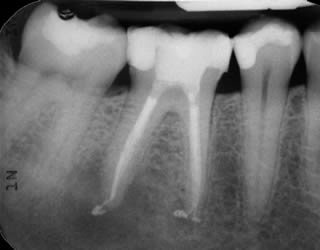What Do Our Wickford Root Canal Dentists Do?

The truth behind this often feared dental procedure.
If there is one thing that patients tend not to want to hear, it is to be told that they need to have a root canal procedure. This particular treatment has gained a reputation over the years as the benchmark for a high degree of pain. It is more than possible that, in the past, this was indeed a painful dental procedure, but then, so were many more before the advent of refined equipment and powerful local anaesthetics. Even a small filling would not be something to take lightly. Thankfully, dentistry overall has improved greatly and that includes the way we carry out root canal procedures.
The field of endodontics, treatments that take part in the inner part of the tooth, is one that is designed to save a tooth that would otherwise need to be extracted. In most instances, this will occur when the root canals of the tooth become infected. In addition to threatening the tooth’s survival, it can also be very painful as the nerves are stored in this area. Abscesses can also form, adding to the intensity of the pain. Given this, it is virtually impossible to ignore the level of discomfort when a root canal infection occurs and a visit to Cygnet Dental Practice will be necessary so that you can receive the appropriate treatment.
What happens then when you come to our practice to have this procedure?
X-rays
Before any treatment can start, it will be necessary to x-ray the area. This serves a double purpose of checking the condition of the tooth, but also enables us to check for the presence of any abscesses. If any are found, these will need to be treated before we start your treatment. This may require antibiotics and the need to postpone the procedure until the abscesses are gone.
Local anaesthetic
As you would expect with a procedure such as this, a local anaesthetic will need to be given to allow the procedure to be carried out with relative comfort. This not only spares the patient a lot of pain, but enables the dentist to carry the procedure out as quickly and smoothly as possible. We know that some patients don’t like the injection that applies the anaesthetic but without it, the procedure wouldn’t be able to go ahead and you would continue to be in a lot of pain.
Protecting the tooth
Before the root canal treatment starts, a protective sheet or ‘dam’ is placed. This helps to protect the tooth from infection and also keeps it free of saliva while the procedure takes place.
Opening the tooth
Once the above has taken place, the dentist is ready to start the procedure. In order to do this, the top section of the tooth will need to be opened up to allow access to the root canals. Once this has been done, the infected soft pulp, including the nerves, will then be removed and the hollow canals filled. They will also need to be shaped so that the filling can be effectively placed into them.
The filling
Standard dental fillings are almost never used for this procedure. Instead, a special material known as gutta percha is used. This is due to its superb sealant properties and will help to prevent the canals from becoming reinfected again.
Adding a dental crown
In most cases, a dental crown will then be added to the tooth. This not only provides it with a more aesthetically pleasing appearance but also gives it additional strength too. This is important as a tooth treated in this way will lack the strength of a healthy natural tooth.
Aftercare
You will be able to use your newly treated tooth to eat with but we strongly recommend that you avoid using it to bite into anything hard. This is partly because it will not be as strong as before but also, as the nerves are no longer present, you will find it difficult to judge how hard you are biting down on things. This means that the risk of breaking it is higher if you use it as you would a healthy natural tooth.
You should brush and floss your restored tooth as normal. Despite it having no nerves and therefore very little chance of a toothache, if the tooth is neglected it is much more likely to break and gum disease is also a greater possibility.
The truth about ‘pain’ caused by this procedure
You will no doubt have heard many tales of extreme pain from ‘people who know people’ who have had this treatment yet rarely from the person themselves. The truth is that as long as any abscesses are detected and treated, there is no reason to be overly concerned with the pain level. Local anaesthetics are very powerful and although there may be a little discomfort from the sensation of the drill etc, you should feel no more discomfort than you would with most other invasive dental procedures.
If you are due to have a root canal procedure at our Wickford dental practice and are concerned about it, our friendly and experienced dentists will be happy to discuss your concerns and set your mind at rest so that you can have the necessary treatment to save your infected tooth.
If you would like to make an appointment to have a tooth that is causing discomfort examined, you can do so by calling the Cygnet Dental Practice today on 01268 733078.
